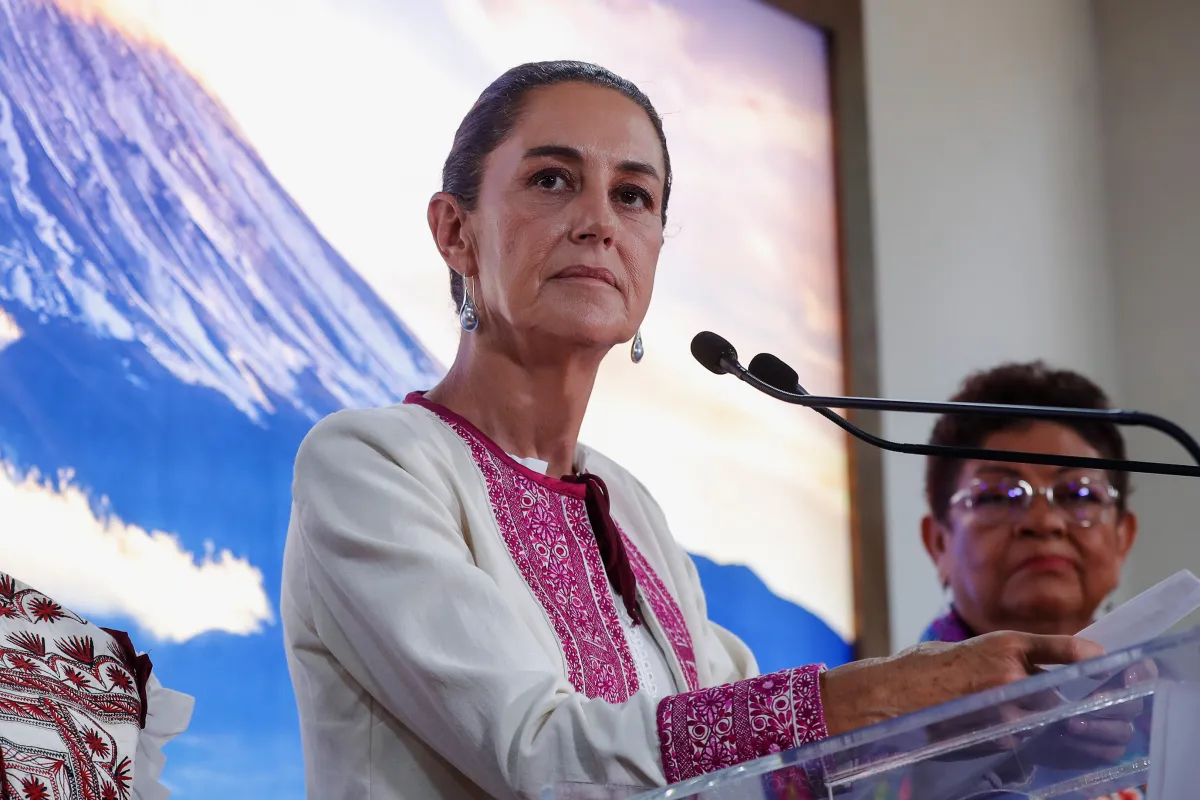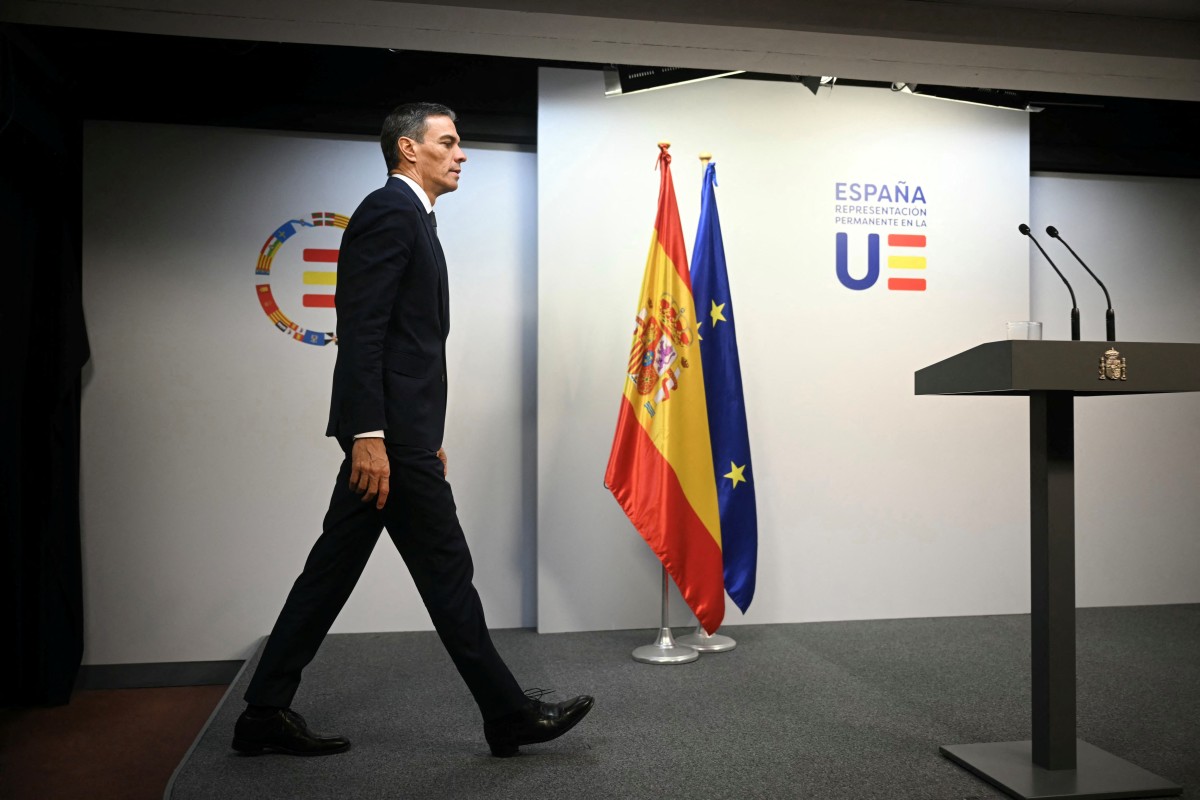International
Sheinbaum says that the indigenous peoples will be subject to law in the Mexican Chiapas

The ruling presidential candidate Claudia Sheinbaum ratified that a central axis of her government project will be the reform of article 2 of the Mexican Constitution. With this, the native peoples will be subject to law, they will be recognized the autonomy of and their forms of organization.
Before more than 7,000 people, he assured that in his administration he will change the face of the state of Chiapas, “through projects that allow care for the environment, the jungles and recognizing the indigenous peoples on the decision of their territories, their natural resources, as well as the culture and their forms of organization.”
He recalled that President Andrés Manuel López Obrador on February 21, on International Mother Language Day, sent the reform initiative to guarantee the rights of the country’s communities and indigenous and Afro-Mexican peoples.
The axis of this amendment, one of the package of proposals made by the Executive Branch on February 5, is “the recognition of indigenous and Afro-Mexican peoples and communities as subjects of public law. As well as the establishment of a legal personality and own patrimony from free self-determination.”
Chiapas is one of the most culturally diverse states in Mexico, largely due to the presence of different indigenous groups in the integration of their societies.
This year, the indigenous peoples have warned of a climate of ‘civil war’ in Chiapas due to the armed conflicts, violence and insecurity that have triggered homicides, disappearances and forced displacements. In particular in indigenous and related communities to the Zapatista Army of National Liberation (EZLN).
Sheinbaum, standard-bearer of the coalition that make up the National Regeneration Movement (Morena), Labor (PT) and Green Ecologist of Mexico (PVEM) parties, was accompanied by the candidate for the governorship of Chiapas, Eduardo Ramírez.
Among his promises of government, Sheinbaum said that for Chiapas “a special program will be opened to look for “fair prices for coffee and corn and it will be a state of development with a humanist look to attend to the migration that comes from the south.”
Sheinbaum endorsed that support for the elderly and young people will continue, so that they have better employment opportunities, health care and access to medicines, so he asked not to believe the lies of his adversaries.
“On June 2, I am sure that love will triumph against hatred, the truth against slander, democracy will triumph against fraud, the indigenous peoples will triumph, humanism will triumph against discrimination, the people of Chiapas will triumph and the people of Mexico will triumph,” he said.
Before hundreds of women and men from the 124 municipalities of the region, Sheinbaum said that in these elections “we are defining the future of the homeland, the future of the people of Mexico, and I am sure that we will do a great job.”
Finally, he recalled that an economic pole will be installed on the southern border of Mexico that will help boost the economy of the region and create new opportunities through the investment of the business sector.
International
Winter Storm Fern Leaves 30 Dead and Over One Million Without Power Across the U.S.

The massive winter storm Fern, bringing polar temperatures, battered large portions of the United States for a third consecutive day on Monday, leaving at least 30 people dead, more than one million households without electricity, and thousands of flights grounded.
In the Great Lakes region, residents awoke to extreme cold, with temperatures dropping below -20°C. Forecasts indicate that conditions are expected to worsen in the coming days as an Arctic air mass moves south, particularly across the northern Great Plains and other central regions, where wind chills could plunge to -45°C, temperatures capable of causing frostbite within minutes.
Across the country, heavy snowfall exceeding 30 centimeters in roughly 20 states triggered widespread power outages. According to PowerOutage.com, nearly 800,000 customers remained without electricity on Monday morning, most of them in the southern United States.
In Tennessee, where ice brought down power lines, approximately 250,000 customers were still without power. Outages also affected more than 150,000 customers in Mississippi and over 100,000 in Louisiana, as utility crews struggled to restore service amid dangerous conditions.
International
Spain approves plan to regularize up to 500,000 migrants in Historic Shift

In November 2024, Spanish Prime Minister Pedro Sánchez announced a reform of the country’s immigration regulations aimed at regularizing 300,000 migrants per year over a three-year period, in an effort to counter population aging in a country where births have fallen by 25.6% since 2014, according to official data.
Going against the trend in much of Europe, Spain’s left-wing government has now approved an exceptional migrant regularization plan that could benefit up to 500,000 people, most of them from Latin America.
The measure will allow the regularization of around “half a million people” who have been living in Spain for at least five months, arrived before December 31, 2025, and have no criminal record, Migration Minister Elma Saiz explained on public television.
The plan, approved on Tuesday by the Council of Ministers, establishes that applications will be processed between April and June 30, enabling beneficiaries to work in any sector and anywhere in the country, Saiz said.
“Today is a historic day for our country. We are strengthening a migration model based on human rights, integration, and one that is compatible with economic growth and social cohesion,” the minister later stated at a press conference.
The socialist government of Pedro Sánchez stands out within the European Union for its migration policy, contrasting with the tightening of immigration measures across much of the bloc amid pressure from far-right movements.
Central America
Honduras swears in conservative president Asfura after disputed election

Conservative politician Nasry Asfura assumed the presidency of Honduras on Tuesday with an agenda closely aligned with the United States, a shift that could strain the country’s relationship with China as he seeks to confront the economic and security challenges facing the poorest and most violent nation in Central America.
Asfura’s rise to power, backed by U.S. President Donald Trump, marks the end of four years of left-wing rule and secures Trump another regional ally amid the advance of conservative governments in Chile, Bolivia, Peru, and Argentina.
The 67-year-old former mayor and construction businessman was sworn in during an austere ceremony at the National Congress, following a tightly contested election marred by opposition allegations of fraud and Trump’s threat to cut U.S. aid if his preferred candidate did not prevail.
Grateful for Washington’s support, Asfura—who is of Palestinian descent—traveled to the United States to meet with Secretary of State Marco Rubio, before visiting Israeli Prime Minister Benjamin Netanyahu.
“We need to strengthen relations with our most important trading partner,” Asfura said after being declared the winner of the November 30 election by a narrow margin, following a tense vote count that lasted just over three weeks.
-

 Central America4 days ago
Central America4 days agoGuatemala’s president rules out negotiations with inmates after prison riots
-

 Central America1 day ago
Central America1 day agoGuatemala seizes over a ton of cocaine hidden in flour at Pacific port
-

 International4 days ago
International4 days agoTrump-Era Defense Plan Prioritizes Border Security and Scales Back Global Commitments
-

 Internacionales4 days ago
Internacionales4 days agoMajor winter storm threatens “catastrophic” ice and snow across much of the U.S.
-

 International4 days ago
International4 days agoBogotá and Quito Seek Dialogue After Tariffs and Power Cut Escalate Tensions
-

 International4 days ago
International4 days agoGuatemala considers sending high-risk gang members to military prisons
-

 International3 days ago
International3 days agoDelcy Rodríguez seeks political agreements after Maduro’s ouster
-

 International1 day ago
International1 day agoHistoric snowstorm paralyzes Toronto after 60 centimeters of snow
-

 International1 day ago
International1 day agoSpain’s irregular migrant population rises to 840,000, study finds
-

 International3 days ago
International3 days agoFederal immigration agents kill man in Minneapolis, sparking protests and outrage
-

 International4 days ago
International4 days agoRights group says over 5,000 killed in Iran protests, mostly civilians
-

 International1 day ago
International1 day agoRights group says nearly 6,000 killed in Iran protest crackdown
-

 Central America6 hours ago
Central America6 hours agoGuatemala Police Arrest Prison Guard Caught in the Act of Extortion
-

 International1 day ago
International1 day agoVenezuela frees at least 80 political prisoners, NGO says
-

 International6 hours ago
International6 hours agoDoomsday clock moves to 85 seconds before midnight amid rising global risks
-

 International6 hours ago
International6 hours agoWinter Storm Fern Leaves 30 Dead and Over One Million Without Power Across the U.S.
-

 Sin categoría6 hours ago
Sin categoría6 hours agoEight Killed in Series of Armed Attacks in Ecuador’s Manabí Province
-

 International1 day ago
International1 day agoEU launches new probe into X over AI-generated fake nude images
-

 Central America6 hours ago
Central America6 hours agoHonduras swears in conservative president Asfura after disputed election
-

 International6 hours ago
International6 hours agoSpain approves plan to regularize up to 500,000 migrants in Historic Shift
-

 Central America7 hours ago
Central America7 hours agoBukele leads public trust rankings as UCA survey highlights gains in security
-

 Sin categoría6 hours ago
Sin categoría6 hours agoEl Salvador Launches Fourth Year of Ocean Mission to Protect Marine Ecosystems
-

 International1 day ago
International1 day agoSevere winter storm grips U.S., leaves multiple dead as extreme cold persists
-

 International1 day ago
International1 day agoFrance debates ban on social media for children under 15


























